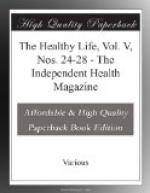For some years I lived according to the advice given by “M.D.” with regard to the quantity of proteid that should be taken. But experience led me to believe that it was wrong. In recent years my diet has consisted of the following quantities per annum:—
Three to four bushels
of wheat.
Seventy pounds of oats.
One bushel of nuts (measured
in the shells).
And with these foods rich in proteid, I have
taken plenty of raw
vegetables and fruit, and three to four gallons
of olive oil.
I do not mention this as an ideal, in order to suggest another and better standard than that of “M.D.” I do not think any such thing as a standard really exists or can exist. But I mention it to show how far I have travelled away from where I was.
I take it that all food reformers will agree that the main reason for food reform is to make the body a more harmonious instrument for the true life of man, and that carries with it the belief that there is some correspondence, if we cannot yet see absolute unity, between the physical and the spiritual. Now the law of life, according to Christ, is one of continual progress towards perfection and I do not see how this will harmonise with the teaching of a fixed law for the body. All my experience and observation point to a progressive law for the body, and I do not know of a single fact contrary to it.
My first point, then, is that there is no such thing as a standard of proteid needed by the body. All that can be said is this, that if you take a man who has been fed on a certain quantity for such and such a time and then feed him on a certain other quantity, alterations in the physical condition will appear. But who can say whether these changes are attributable merely to a deficiency or to a previous excess? If “M.D.” and his patients take excessive food they naturally get trouble from stored poisons when they reduce the quantity. But why put all the trouble down to present deficiency instead of to previous excess? To this I can find no satisfactory answer.
If we have got our bodies into so hopeless a condition that we cannot use our God-given instincts, tastes and feelings in the first place, the wisdom of troubling much about the continuance of bodily life would be doubtful; and, in the second place, one would need most overwhelming signs of knowledge to substitute for them. But where are they? There is no agreement between those who have been taught physiology. On the one hand, “M.D.” gives a proteid standard, now impossible to myself, and I believe to many others, for it would involve eating a nauseating quantity; and, on the other hand, another doctor, presumably acquainted with the same physiology, tells me I cannot eat too little, so long as I do not persistently violate true hunger and taste. Then another doctor gives quite a different standard, and a much




